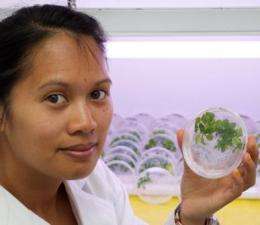A Flinders University researcher is digging deep to discover how certain bacterial strains found in wheat can stimulate a plant’s natural defence fighting mechanisms.
Biotech graduate and PhD candidate Tanya Bernardo has spent the past four years studying a beneficial bacterium living in wheat, and the role it plays in helping plants fight off disease.
To support her investigations, Ms Bernardo coated plant seeds with the wheat bacteria before injecting them with a plant pathogen – a biological microbe that causes diseases – to determine whether the bacteria stimulated an immune response.
While other field studies have already established the positive external effects of wheat bacteria on plants, Ms. Bernardo said her research, funded by the Grains Research Development Corporation, was the first of its kind to identify what internal factors lead to the most effective protection.
“Previous research has just looked at the outside of a plant to confirm the bacteria’s positive defence effect but not a lot has been done to investigate exactly how the plant fights off disease and what mechanisms are involved in it being protected,” the 25-year-old said.
“But I really wanted to find out why pre-treated plants have a better survival rate than those that don’t get the bacterial treatment, and what factors result in the most effective form of treatment.”
Ms Bernardo said her findings had shown diseased plants that were treated with the good bacteria developed a defence response protein “growing in abundance”.
“It really opens the door to further study because I only looked at one type of good bacteria living in wheat but there are dozens of others that could stimulate the same defence proteins.”
Now in the writing phase of her project, Ms. Bernardo said she hoped the findings could be used to develop a “bacterial inoculation” that could be used across Australia’s grain industry.
“Developing a vaccine would be far less invasive that using pesticides to fight disease and it might actually stimulate plant growth as well.
“That would result in significant improvements in crop yields and less use of fertilizers.”
Provided by Flinders University





















